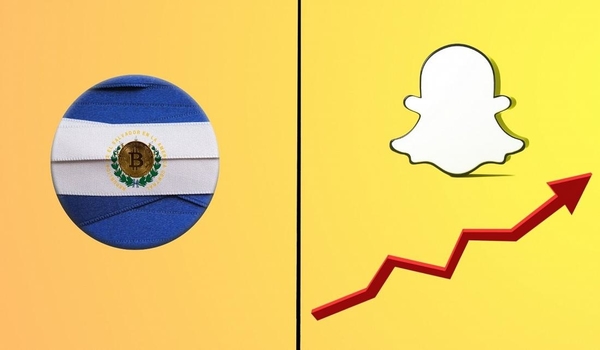El Salvador rejects IMF call to drop Bitcoin use and Snap shares surge 50%
The government of El Salvador on Monday rejected a recommendation by the International Monetary Fund (IMF) to drop Bitcoin as legal tender in the Central American country.
El Salvador became the first country in the world to make Bitcoin legal tender last year.
Treasury minister Alejandro Zelaya angrily said that “no international organisation is going to make us do anything, anything at all”.
Zelaya told a local television station that Bitcoin is an issue of “sovereignty”.
“Countries are sovereign nations and they take sovereign decisions about public policy,” he said.
The IMF had urged El Salvador to drop Bitcoin as legal tender and better regulate the digital wallet the government created and promoted to its citizens at the end of January.
“The adoption of a cryptocurrency as legal tender, however, entails large risks for financial and market integrity, financial stability, and consumer protection,” it said in a statement.
Zelaya said El Salvador has complied with all financial transaction and money laundering rules.
The IMF also recommended eliminating the offer of $30 (€26.19) as an incentive for people to start using the digital wallet Chivo and increasing regulation of the digital wallet to protect consumers.
It suggested there could be benefits to the use of Chivo, but only using dollars, not Bitcoin.
“In the near-term, the actual costs of implementing Chivo and operationalising the Bitcoin law exceed potential benefits,” the report said.
Salvadoran president Nayib Bukele had been dismissive of the IMF’s recommendations concerning Bitcoin.
Government officials told the IMF that the launch of Chivo had significantly increased financial inclusion, drawing millions of people who previously lacked bank accounts into the financial system.
They also spoke of the parallel tourism promotion targeting Bitcoin enthusiasts.
The government did not see a need to scale back the scope of its Bitcoin law, but agreed regulation could be strengthened, according to a report.
Bukele led the push to adopt Bitcoin as legal tender alongside the US dollar. El Salvador’s Legislative Assembly made the country the first to do so in June with the Bitcoin law taking effect in September.
Snap said on Thursday that its advertising business has bounced back from the effects of Apple’s privacy changes faster than it expected.
Shares in the company skyrocketed 50 percent after it provided a first-quarter outlook that surpassed analyst estimates.
The results were good news for a tech sector that has been hammered this week over gloomy outlooks and concern that Apple’s privacy updates, which were introduced last year and allow users to prevent apps from tracking their online activity for advertising purposes, would hurt ad revenue.
Snap forecast first-quarter revenue between $1.03 billion (€899.7 million) to $1.08 billion (943.4 million), and daily active users to be between 328 million to 330 million.
The guidance for both metrics surpassed analyst estimates, according to IBES data from Refinitiv.
Digital pinboard company Pinterest also reported higher-than-expected revenue on Thursday and its shares rose by 20 percent.
The earnings reports from both Snap and Pinterest contrast with that of Facebook owner Meta, whose shares fell 26 percent on Thursday in what could be the largest single-day wipeout in market value for a US company, a day after it said the impact from Apple’s privacy changes could be “in the order of $10 billion [€8.74 billion]” this year.
Meta said the Apple updates hurt advertisers’ ability to target ads to potential customers and measure the effectiveness of ads.
A large portion of Snap’s advertisers began using new ad measurement tools by the end of the fourth quarter, and parts of Snap’s advertising business began to recover from the Apple changes “quicker than we anticipated,” said Snap Chief Financial Officer Derek Andersen.
However, global supply chain disruptions and labour shortages hurt advertising demand from consumer packaged goods and restaurant brands, he added.
Meta’s shares plunged 20% while Facebook lost daily users for the first time ever. Here’s why
Snap’s revenue for the fourth quarter ending on December 31 was $1.3 billion (€1.14 billion), an increase of 42 percent from the prior-year quarter. The figure beat analyst expectations of $1.2 billion (€1.05 billion), according to IBES data from Refinitiv.
Daily active users on Snapchat rose 20 percent year-over-year to 319 million, beating consensus estimates of 316.5 million.
Snap still has a long runway for growth compared to larger tech rivals. It has developed a strategy to attract new users across Latin America, Europe and Asia. Meta reported Wednesday that Facebook has 2.91 billion monthly users globally, which showed no growth compared with the previous quarter.
Snap also reported its first quarter of positive net income since its initial public offering, with earnings of $22.5 million (€19.65 million) in the fourth quarter, compared with a net loss of $113 million (€98.69 million) in the prior-year quarter.




